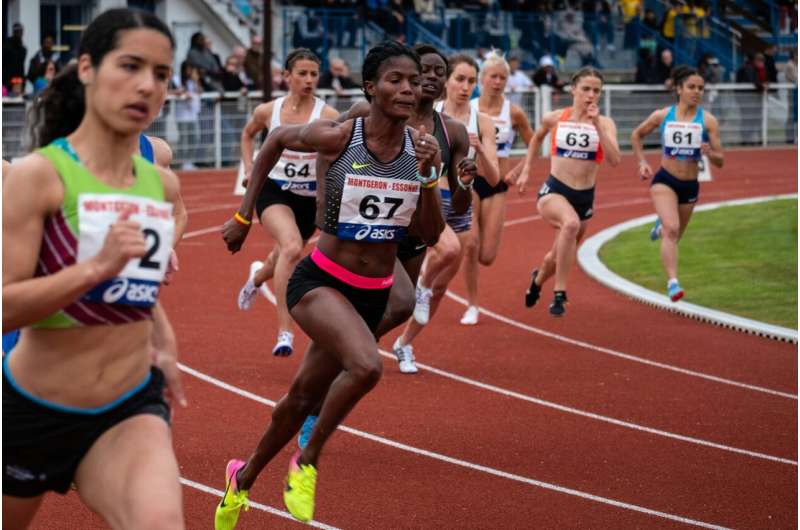This article has been reviewed according to Science X's editorial process and policies. Editors have highlighted the following attributes while ensuring the content's credibility:
fact-checked
trusted source
written by researcher(s)
proofread
Balancing the narrative: Celebrating Olympic mothers without losing sight of the postpartum struggle

The postpartum period is a time of anatomical, physiological and psychological transition. The recent Olympic Games brought to light the exceptional capacity of women after the birth of a child and is a story of success for women athletes globally.
However, it is important to recognize that this elite level of sport and success postpartum is not a realistic representation of the experience of most mothers in attempting to return to movement after the birth of a child, even those desiring to return to elite competition. In a March 2023 article, distance runner Kara Goucher reflected on the negative impact returning to running too soon after the birth of her son had on her body and emotional well-being.
In a world where we seek lifestyle-based advice from social media and are inundated with unrealistic images of postpartum women and physical activity success, the global conversation around motherhood success at the Olympics may negatively impact those who are "just trying to survive" the early years of parenting.
New mothers and physical activity
When Olympic mothers are interviewed, they are often modest about their achievements and discuss the exceptional amount of support needed to reach their goals. This includes both social support in infant rearing and access to health-care professionals in effective rehabilitation and return to movement.
These are components most new mothers do not have access to. Many new mothers struggle with finding the time and knowing how to start engaging in physical activity after the birth of a child.
In my work in postpartum physical activity engagement, I hear from mothers about their experiences and challenges in postpartum physical activity. Many mention the "bounce back" narrative, which creates a personal and societal expectation that new mothers should quickly return to their pre-baby body.
Further, mothers describe achieving weight loss and physical activity engagement as a measure of motherhood success and feeling as though they are failing when this is unattainable. Lower physical activity levels are reported postpartum due to the extensive barriers faced by new mothers. These postpartum barriers to physical activity may be compounded by feelings of guilt when taking time for leisure activities.
As an exercise physiologist and physical activity advocate, I work to find ways to support postpartum women in modifying their behavior and expectations to make movement realistic postpartum without adding to the emotional turmoil often present in new motherhood. This includes recognizing the significant impact of fatigue on physical activity capacity.
While pregnancy may embrace a changing body shape and size, many mothers experience increased body dissatisfaction in the postpartum phase when they are unable to return to their pre-pregnancy weight. When women were asked in a 2007 study about their body satisfaction, 87.4 percent of respondents wanted a smaller body 12 months postpartum.
This dissatisfaction may be related to the higher level of online comparison with postpartum women engaging with social media influencers that they saw as "attractive." As noted in a 2022 study, postpartum women who have lower body fat are more inclined to post images on Instagram tagged with #postpartumbody than postpartum women with higher body fat.
This influences what postpartum women denote as "normal" postpartum. This is a concern because postpartum women who engage with body-focused social media posts were more likely to report higher levels of body dissatisfaction and poorer eating behavior.
Unrealistic expectations
One factor that may be leading to a negative relationship between physical activity and postpartum body image is the lack of realistic physical activity content for postpartum women. These women are trying to navigate how to engage in physical activity in a changed body. Not having realistic depictions of the postpartum phase is misleading, and is pushing postpartum women to look to social media for fitness and health information.
As stated by one participant who completed our 12-week mind-body physical activity program online:
"You have all this extra baby weight. You're not sleeping well. You're trying to adjust to this new normal of having this little life and then you get this video of perfectly skinny people doing all these crazy moves and contortions."
While we celebrate the achievements of Olympic mothers, it is important to note that these exceptional bodies post-motherhood were achieved with an ample amount of social support through the trials and tribulations of motherhood, advanced coaching and rehabilitation and, of course, dedication and training. Even in the case of some Olympic mothers such as Goucher, this may not be enough to prevent the negative impact on an elite athlete's emotional and physical well-being.
We should celebrate these accomplishments while also learning the personal stories of athletes' challenges in motherhood and returning to training and sport. While we can appreciate the exceptional performance of mothers in the recent Olympic Games, we must ensure we remain aware of the challenges faced by mothers and ensure that we provide realistic role models around motherhood, postpartum bodies and physical activity engagement.
This article is republished from The Conversation under a Creative Commons license. Read the original article.![]()




















